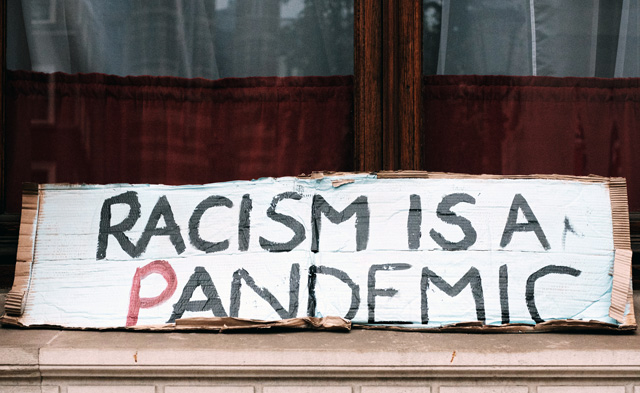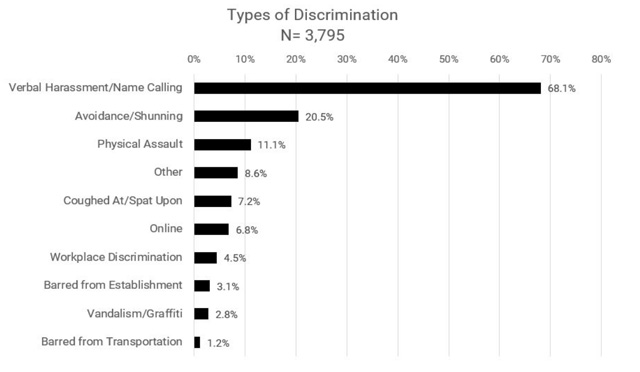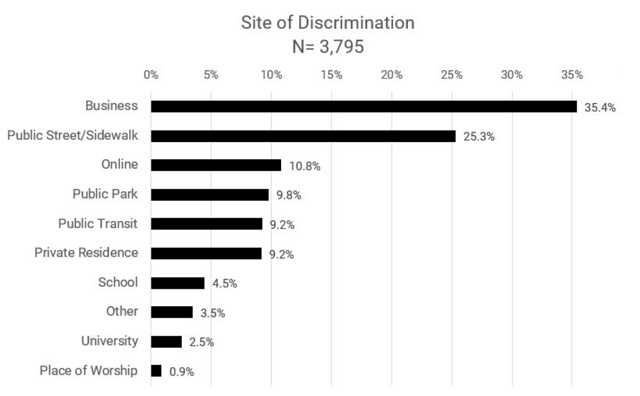Pandemic Spurs Spike in Anti-Asian Hate

(Ehimetalor Akhere Unuabona)
By Aisatou Fisiru
For the last year, the Asian American community has been discriminated against and members have been victims of violent hate crimes. According to Stop AAPI Hate, 3,795 racially-motivated attacks occurred from March 19, 2020 to February 28, 2021, with women being targeted more than men. This is likely an underestimate as many incidents go unreported, said the report authors.
The types of attacks vary from verbal harassment to violent assaults, according to Stop AAPI Hate. Sixty-eight percent of incidents were verbal harassment. Twenty percent were shunning, or the deliberate avoidance of Asian Americans. Eleven percent were physical assaults. Chinese are the ethnic group with the highest number of incidents at 42%, followed by Koreans with 15%.

(Source: Stop the AAPI Hate)
A few examples collected in the Stop the AAPI Hate report include:
A white man catcalled me, then aggressively followed me down the block, and got inches from my face and yelled “Ch*nk!” and “C*nt!” after realizing I was Asian. Lots of neighbors were standing outside their homes and no one intervened. (Brooklyn, NY)
This specific incident was in a NYC grocery store where a man started screaming at me and called me a “disgusting f*cking animal,” told me to “get the f*ck out of the store,” asked if I was crazy, and told me to “go back home” and “get out of the f*cking country.”He followed me around the store screaming at me and nobody did anything. (New YorkCity, NY)
There was graffiti in front of a supermarket that said “CHINA OFF MY FACE.” It was written quite large for pedestrians to read as they walked by. (Astoria, NY)

(Source: Stop the AAPI Hate)
Ray Low, 29, a Chinese-American pastor uses his voice to address the ongoing cruelness against the Asian-American community. Low explains that hate against Asians has been alive long before the Covid-19 pandemic began. “Asians have always been faced with invisibility, silencing, and erasure,” said Low. “While this is partly because our parents came to this country without knowing the language and the culture, and worked hard by putting their heads down and working obediently to provide for our generation, it also comes from historical instances of discrimination including the Chinese Exclusion Act and the forced internment of Japanese Americans.” The Chinese Exclusion Act of 1882 and the imprisonment of Japanese Americans in the United States were difficult times for Asians. They were discriminated against and had to suffer brutal conditions solely because of their race and backgrounds.
Yuling Lin is a teen who emigrated to the U.S from China in 2009 with her parents and her elder sister. She arrived when she was only 6 years old. Lin can remember encountering discrimination as early as elementary school. “I remember constantly feeling like I was, you know, innately different (asides from the literal facial difference) and I wanted to assimilate so badly,” said Lin. “My classmates would ask me where I was from and not take any answer besides ‘China’. It’s moments like that that make me feel discriminated against, even if they did it on purpose or not.”
The Covid-19 pandemic breaking out in China first has quickly made some people think of it as the “China Virus” and it has made matters extremely difficult for the Asian community here in the U.S. There are many reported incidents where Asians have been assaulted by strangers and, in some cases, severely beaten or murdered.
As a result, Lin says she has changed her every day behavior. “When I am walking by myself and I notice someone coming my way, I would either cross the streets to get on the other side or run to my destination,” said Lin. “When I’m waiting for the train, I would stand behind a pole or some sort so people would have a much harder time pushing me onto the track when a train is entering the station.”
Lin says she is both angry and scared about the recent increase in hate crimes. She fears for her mother and sister. There have been many reports of Asian women, in particular, being attacked. Many violence has sparked widespread protests.
Low says that enough is enough. He has been trying to find different ways to stand up for his community. He and his church has partnered with Korean communities and organizations in hopes of finding solutions on how to protect their elderly and woman. “I also have close ties to Manhattan’s Chinatown, where we have partnered with initiatives including Protect Chinatown to provide bystander support for the locals.” He hopes these efforts will help them find solutions to this problem. He attended different rallies around the area. Lin describes the energy during these rallies and he is impressed by the positivity and dedication. “I appreciate the vast diversity of protests that we’ve seen so far,” said Low.
Lin emphasizes the importance of being vocal about racism. She feels that she is limited to what she can do because she is very young, but she says that collectively there are no limitations. “I think a lot of people underestimate how helpful it is to even inform one person on how they are being discriminatory, how they can help.” Educating people on social justice can spread like Covid-19, said Lin. “You educate two people and they each educate two more people the next day. It all adds up,” she said.
Being heard also means forming partnerships and having conversations with leaders and elected officials, she said. “We don’t have to do it all on our own,” said Lin. Low and Lin both advise people to come together to fight. “The world is what we make of it and if we feel like we are fighting this battle alone, there will never be change, justice, and true equality and equity,” said Lin.
Saved under Coronavirus, Featured Slide, News
